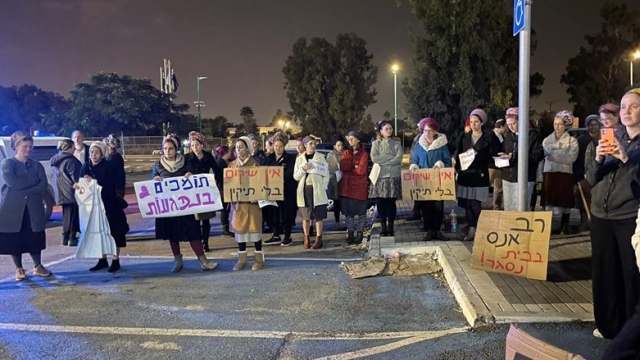Members of Israel's 'Great Rabbinical Court,' Rabbi Eliezer Igra, Rabbi Shlomo Shapira, and Rabbi Zion Luz gave an unusual, yet common sense ruling after a Rabbi was released from prison after serving seven and a half years for sexual offenses he committed against several women in his congregation when he served as Rabbi.
In a comprehensive ruling published by the rabbis, stemming from their requirement to answer the question regarding Rabbi Ezra Sheinberg's return to his community in Golan Heights, the court states a number of things the convicted sex offender must do to seek forgiveness. Apart from the standard practices of asking for forgiveness from the victims, the rabbis make it clear that he must shave his beard and negate any rabbinical sign he may have so that he cannot use that to take advantage of anyone else.
Rabbi David Stav: That is how it's best to take care of Ezra Sheinberg - knittershttps://t.co/nspd2ohanu
— WORLD NEWS (@WORLDNE10696852) January 2, 2023
In the published opinion, the court states: “Our opinion below does not deal with the criminal aspects dealt with by the state authorities, we deal exclusively with the social and religious aspects of the question described above. Below is our brief and concise opinion on this serious matter, and later a broad and reasoned opinion will be given. It will be said that any community of the nation of Israel that believes in the ways of God and His Torah, is not allowed to accept such a person into their community before he has repented of his actions according to the ways of repentance outlined by Rambam in his teachings."
The opinion proceeds to say the former rabbi must “remove from himself any rabbinical and Torah mark so that he does not come to fail others again in his actions, including shaving his beard, and he will not put on himself any rabbinical clothing. This is in accordance with the Rambam's “Halchut Talmud Torah…He will not lead himself in the rabbinate in any way and shape. He will not teach any Torah lesson. He will not give advice or answers in any matter to any person, and if there is someone who turns to him to receive his advice, he must reply ‘I am not worthy at all, and I never was worthy, I only misled others with my advice.’"
Ezra Sheinberg, rabbi and former yeshiva head from the northern city of Safed released from prison
— #FirstThem NEWS🇺🇸 (@FirstThemNEWS) January 4, 2023
-
✡️ Covering the Jerusalem-Jewish Sexual Abuse Epidemic.
🤡#standwithisrael🤡#IStandWithKyrie💯 #FreePalestine✊🏾 #ForeverPalestine🇵🇸https://t.co/1GehdSTkYM pic.twitter.com/I3Z61prWut
The Great Rabbinical Court in Israel typically avoids releasing opinions on cases that are heavily reported on to avoid political confrontation, however, due to the severity of the former rabbi’s actions the leading rabbis felt they had no choice but to intervene.


